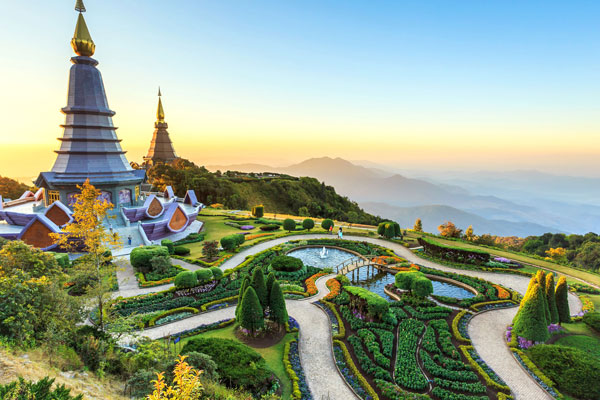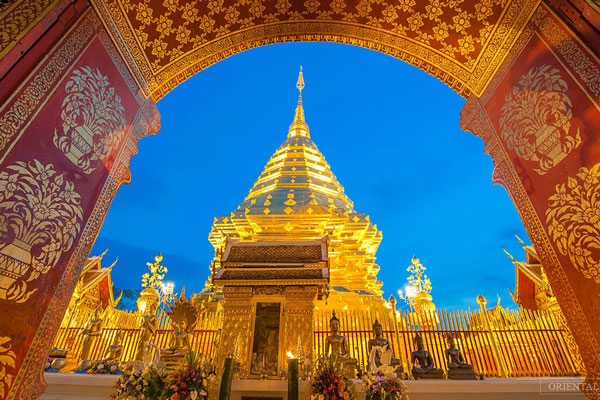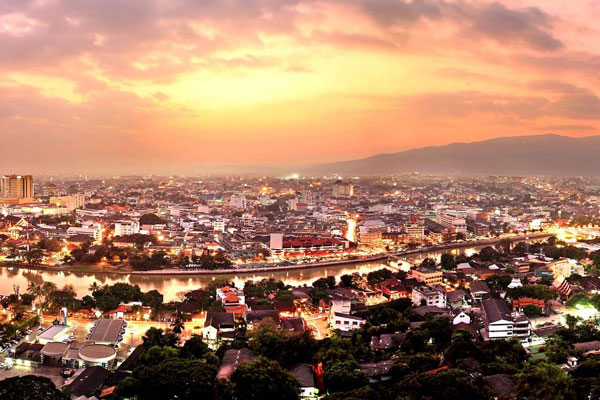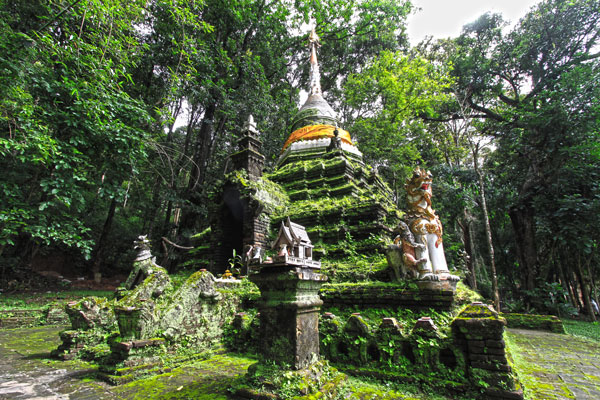Discover the beautiful city of Chiang Mai and all it has to offer.
General Information
Chiang Mai means “New City” in Thai, although the city is actually more than 700 years old. It receives around 2 million foreign visitors a year and was one of two tourist destinations in Thailand on TripAdvisor's 2014 list of "25 Best Destinations in the World" (current standing number 24).
There are an estimated 25,000-30,000 full and part-time foreign expats living in Chiang Mai. Along with a handful of other nationalities, Chiang Mai's expat community is comprised primarily of Chinese, American, British, French, Japanese, and Korean nationals. Several English language magazines, a newspaper, and various clubs, communities and societies support this foreign contingent.
The burgeoning Chiang Mai expat community has created a healthy demand for ‘foreign-friendly’ services, including English-speaking lawyers, business and investment consultants, property agents, and various expat-interest groups. There are also many international schools, along with several supermarkets which are well stocked with imported foods.
Chiang Mai has a laid back atmosphere, enjoys a mild climate most of the year, and, above all, is affordable. The Northern Thais are well known for their friendliness and don’t mind sharing their city, particularly if it helps the local economy.
The city is in part modern and trendy, with art galleries, boutique shops and cinemas, and in part steeped in traditional Thai ‘Lanna’ culture, dotted with lovely old temples and narrow city lanes of wooden houses. It’s the former capital of an ancient kingdom, but also northern Thailand’s biggest university town (with coffee shops and nightclubs to prove it). A short drive from a wonderful range of national parks and waterfalls, the city is big enough to keep things interesting but small enough to make it homely and to ensure you always run into someone you know.
“Foreigner-friendly” comforts are easy to find if you like. Hamburgers and pizza are pricier than pad Thai (Thai fried-noodle dish) but they’re not hard to find when cravings strike. You can go for a run at the municipal stadium where the Thai high school kids do sprints and the older folks jog, but you can also run on the treadmills in the air-con at modern gym. You can buy your fruits and veggies at the local markets or head to the big supermarkets on the outskirts of town.










Situated in Northern Thailand, 700km north of the capital city of Bangkok. Chiang Mai is the second largest city in Thailand. It sits in a broad valley at an elevation of 330m above sea level. The valley is bisected by the Ping River, with the Doi Suthep/Pui mountains to the immediate west and the Doi Saket hills a few kilometers off to the east: an excellent location with good transport routes and fertile surrounding farmland.
Although northern Thailand is generally mountainous, this valley is entirely flat and covers some 200 square kilometers. As much as 70 per cent of Chiang Mai province is covered in mountains and forests. Agriculture – mainly fruit, vegetables and some rice cultivation – is the mainstay of the local economy
The Chiang Mai Metropolitan Area has a population of approximately 1,700,000 people (2016), more than half the total of Chiang Mai province. Approximately 400,000 people live inside the city center which reaches to 500,000 during high season.
The population is traditionally northern Thai with scatterings of minorities such as Shan, but being a relatively wealthy city it’s now attracting workers from across the kingdom, and being an attractive place to live means it also sees a steady flow of more affluent Thais from Bangkok and elsewhere. Chiang Mai’s also very popular with expats and Thai tourists as much as foreign visitors.
Chiang Mai enjoys a mild tropical climate with three distinct seasons regulated by mountainous terrain and a monsoon season. Generally speaking, the temperature averages around 28°C for the year.
Cool season arrives in November to February and is typified by dry weather and temperatures ranging from 15°C to 25°C in the valley
Hot season is from March to May, the hot season is the least pleasant time of year, culminating in temperatures reaching 40°C at midday in April, averaging 32°C.
Rainy season sees the first rains begin in late May and the rainy season continues through to October, with humidity above 80 per cent and daily afternoon downpours rather than a steady stream of water. Rainfall tops 250mm in September with lengthy overcast spells and all-day showers.
Note: Middle of February through early April is Chiang Mai's burning season. “Slash-and” agriculture means that waste from rice and maize harvests is burned this time of year, together with some forest burning and general trash disposal. This can be become uncomfortable and unhealthy for sensitive people.
There are several ways to get around Chiang Mai.
- Local taxi service. Rót daeng (literally 'red trucks') operate as shared taxis, serving as the informal commuter of the city. There are both fixed routes and non-fixed routes and often the easiest thing to do is to ask if the driver will take you where you want to go. Journeys start from 50 Baht for a short trip. Taxis are also found but limit themselves to the airport run and private calls. Tuk Tuks are usually gathered in tourist areas.
- GRAB Taxi or Uber (mobile app). Both apps are widely used and prices are cheaper than taxis or tuk tuks. Some have complaint of double charging, cash payment to driver and charges to credit card on file. Not putting credit card info when setting up account might be better way to go.
Car rental starts from 1,000 Baht a day, with month lease rates from 24,000 Baht. Second-hand cars are expensive compared to Europe and cost anything from 100,000 Baht (10 year old Mazda 323) to 300,000 Baht (five year old Honda Civic).
- Renting Along with the main companies that have booths at the airport, there are a number of smaller companies around the city, but prices are much the same. Panyaden families have recommended Chiang Mai Wheels and Red Ride Rentals
- Buying new There are new car dealerships all over town.
- Buying used Expat Auto (083-572-8488) speaks English and always have a selection of cars. They can take care of everything including insurance quotes and transfer of ownership. Second hand cars can also be found for sale on various Facebook Groups including:
- Friends Of Panyaden
- 2nd Hand Chiang Mai
- Chiang Mai Buy, Sell, Swap
- Chiang Mai Used Cars
- CNX Market
Drivers’ License must be applied for at CM Provincial Land Transport Office near BigC on Hang Dong Road. Remember to bring the following items:
- License from original country
- Passport and copies
- Doctor report (CM Klaimore Hospital on Hang Dong Road charges 120 baht)
- Fees for photo and license
- Resident certificate (Please see separate entry under Immigration.)
- School Bus. There is a school bus with limited seats run by a parent.
Contact person is Julien - julien_valeregille@yahoo.fr
Rent ranges 10-15,000 for a small (2/3-bed) house to 35,000++/month if you want something larger and better equipped. Of course, prices vary depending on location, distance from the city, mod cons etc. There are some real bargains once you get to know the city. Ask around for recommendations. It is possible to get short term rental contracts (ex: 3-6 months) but most landlords expect a minimum 1 year contract plus one month rent in advance and one month deposit. Serviced apartments are available on a monthly basis. The best way to get a feel for the neighborhood and moo baans (housing complex with security guard) is to drive around. Some houses are not listed with agents but only have a sign posted.
Rough price guide would be:
- Budget Home 10,000-15,000 Baht/month: 1-3 bedrooms, kitchen, living room, small garden (old traditional wooden houses may be cheaper)
- Standard Home 15,000-20,000 Baht/month: 3-4 bedrooms, western style kitchen, living room, garden
- Large Family Home 25,000-35,000 Baht/ month: 3-5 bedrooms, western style design, kitchen, living room, garden, en-suite bathrooms, etc.
Housing Agents
There are many agents in town, most of which have English speakers. They tend to rent houses at a higher price than if you rent direct from a landlord, but for a newcomer this may be your best option until you get to know the city. Some popular ones are:
- Perfect Homes
- Chiang Mai Properties
- Chiang Mai House
- Chiang Mai Best Homes
- ddproperty
- Khun Pisit 095-996-9789
- Perfect Homes 053-352-532
- Chiang Mai Estate Agents 082-256-8327
Some helpful Facebook groups are:
The city center is around 20-30 mins from school, depending on traffic.
The Canal Road leads all the way to school from the new part of the city and is a good route to be close to. Anywhere along this road (up until Kat Suan Kaew Road) will mean you are never more than 20-25 mins drive away from school. There are many residential areas, such as Mae Hia, Wat Umong, Pong Noi, Nimman, on both sides of the Canal Road.
If you want to be close to school, Hang Dong, Nam Phrae, and Nong Khwai sub-districts are the best and no more than 5-15 minutes away. Housing in Chiang Mai is either in gated residential areas (moo baan, which tend to be more expensive but have extra facilities like pools and gyms), or in regular villages and sub-districts.
A few moo baans close to school that are popular with Panyaden families include:
- Home in Park (around 20-30k for 4 bedroom+ homes)
- Lanna Montra
- Lanna Pinery (very green and quiet)
- Rungaroon 3 (more affordable)
- Masterpiece (VERY nice pool!)
- Lanna Thara
It is fairly easy to open a bank account. Bangkok bank branch in Kad Suan Kaew has a good reputation among Farangs. Usually, the bank only requires passport, initial deposit of 500 baht and ATM card fee to open an account, even with a tourist visa. Some countries’ citizens are asked for resident certificate though. Please see separate entry under Immigration to obtain one.
Landline phones cost 3 Baht for an unlimited call. A SIM giving you calls and data costs around 250 to 500 baht a month. Sims can be bought at any AIS, DTAC or TRUE shop or booth. These can be found in all shopping centers.
Broadband is now widely available in most suburban areas with price 600-1200 Baht/month, including taxes. Providers include 3BB, TRUE, and AIS.
The standard of private healthcare in Thailand is considered on a par with developed countries and affordable to most expats. Hospitals include Bangkok Hospital, Chiang Mai Ram, Chiang Mai Klaimor Hospital, Lanna Hospital, Sripath Medical Centre and Rajavej Hospital. At Chiang Mai Ram, a VIP card is available for purchase to get discount on medicine and other costs.
Family Practice
Dr. Morgan at Health Care Medical Clinic is very popular with families. Call 082-766-8672 www.facebook.com/HCMCdrM/
Dental
- Empress Dental 053-111-299
- Mukmai Dental Clinic 053-416-328-9
- Friendly Dent 086-429-3110
Health Insurance
Companies that provide health insurance for expats include:
- ACS Insurance. Andy Williams. Andy@cnxinsure.com
- Thai Visa Assist can provide quotes for other health insurance companies (Thai and international). Call 053-272-293
- Bupa Insurance 053-218-222
Emergency Ambulance. ?????
Bangkok Hospital Call 052-089-811, 052-089-801
Chiang Mai Ram 053-920-330
McCormick 053-921-799
Tourist Police 1155
Food is good value in Chiang Mai. If you eat where the locals do there’s no reason to pay more than 50-70 Baht a meal. Step into the tourist spots and the prices go up. For western food, you can expect to pay at least 120-250 Baht a dish. You can spoil yourself with a big meal for two for 500-800 Baht at a decent restaurant. Even an evening for two at one of the five-star hotel restaurants may only cost 1,500 Baht.
Staple groceries are on the rise but still well priced (dozen eggs: 70 Baht, liter of milk: 45 Baht, loaf of bread: 40-100 Baht) and the big supermarkets carry everything you need. Those catering to foreigners’ tastes, such as Rimping or Tops, are more expensive and some ‘exotic’ imported items can cost more than in your hometown supermarket.
- Rimping has many products Westerners are familiar with.
- Big C and Tesco Lotus (not express) are like Target or Walmart from US.
- Mae Hia and Hang Dong are wet markets, for vegetables (Mae Hia has organic vegetable stand), meat, fruits, pre-cooked Thai food, etc.
- Wet Market at corner of Canal Road and Samoeng Road (first traffic light from school, if going towards city). Much cheaper vegetables than Mae Hia market. Only open some evenings.
- Chiang Mai Organic Market is further up Canal road. It’s only open on Mondays, Tuesdays and Thursdays from 2-5.
- Royal Project shop is located near Royal Project Park (close to Night Safari). Very cheap prices but prepare to buy in bulk!
Shopping
The city is known mainly because of the Sunday and Saturday markets and the Night Bazaar, which spread across the main streets. These are usually very busy and crowded affairs. It is worth going to one of them to see the great selection of hand made goods and seeing the local artists at play. However, there are a lot of other places in Chiang Mai, where you can shop more comfortably.
- Warorot Market offers almost anything you need: fruit and vegetables, clothes, Chinese medicines and spices, you can fix your watch here and make your own suit. This place also hosts the flower market at night.
- Central Festival, Central Airport Plaza, Promenada and Maya Malls. You will find everything here from H&M to Mango and Marks and Spencer. The prices are the same as in the west. The only difference is the nice and always helpful customer service and no queues to the fitting rooms, even during the sales. Highlights include ice skating at Central Festival, roller-skating at Central Airport Plaza, Friday nights food stalls with live music at Promenada Mall.
- Nimmanahaemin Road. This is a trendy area, lined up with boutiques and stylish cafes. During the day, it is pretty quiet. You can shop there for hand made goods and quirky souvenirs. During the night visit it to see how the young and beautiful of Chiang Mai party.
- Handicraft villages. The more serious shopper can head out to the huge handicraft wholesalers at San Kamphaeng, at the same time checking out Borsang village with its colourful umbrellas. Baan Tawai, to the south of the city, is a busy working carving centre with some exquisite pieces on display and the best selection of antiques.
- Premium Outlet. Not too far from school is outlet mall with stores like Nike, Adidas, Crocs, Pena House and Lacoste, just to name a few.
The immigration office is at Promenada Mall. Even though the mall doesn't open until 11am, the immigration area opens at 8am and is crowded by 6-7am.
Resident Certificate
This is needed to buy a car, to get a drivers’ license and to open a bank account.
- Fastest and most expensive: from embassy (US embassy charges 1750 THB but get it right away)
- Medium speed and cost: Promenada Mall, ground floor, guy next to copy room. Cost is around 500-1000 baht and pick up next day
- Slow but cheap: Promenada Mall, second floor, behind Amazon café. It can take anywhere from 2-4 weeks, but it’s free!
TM30 (out of country reporting)
- Promenada Mall, second floor, behind Amazon café.
- For first time, landlord needs to do the reporting but you keep the receipt in passport
- Every time you leave the country, you (no need for landlord) have to report again. Just need passport and previous receipt.
90 days reporting
- Promenada Mall, ground floor
- Fill out form that’s available outside the big room. There are people who will check your paperwork and give you a queue number. Wait is not long and no kid needed.
- Education visa.
- Promenada Mall, ground floor, room 2 (outside the mall)
- Line up around 7am to get a queue number to come back later. They start handing out numbers around 8am. No need to bring kid(s) for this part but have all their paperwork with you. They also tell you what time to come back, according to your queue number(s).
- Go back at appointed time with kid(s) and prepare to wait. Even after your number is called, it still takes about half hour.
- Besides paperwork from school, you need to bring copy of TM30 (out of country reporting receipt).
- Please be aware that one year visa is single entry. If you plan to leave country during that year, you also need to apply for a re-entry permit.
- Re-entry permit.
- Promenada Mall, ground floor, the big room (outside the mall)
- Fill out form that’s available outside the big room. There are people who will check your paperwork and give you queue number. Wait is not long but kid(s) need to be present.
- Need copy of passport pages, and departure card.
- Multiple entry cost 3800 THB, single entry THB 1,000.
Cultural
The moat and five restored gates protect the large number of temples that are found among the quiet lanes within. Thapae Gate (with its market square) is the most central, and from here you can walk eastwards to the Ping river.
Of the 300 ornately decorated Buddhist temples in the city, the most famous include; Wat Phra Singh (with its Sinhalese Buddha), Wat Chiang Man (the oldest – c1300), Wat Chedi Luang (with an enormous ruined landmark chedi) and Wat Phan Tao (entirely constructed from teak). Wat Jet Yod and Wat Suan Dok, a little out of town, are both over 500 years old and have fascinating histories.
A trip to the top of Doi Suthep (mountain) that presides over the west of the city is a must. Its temple is one of Thailand’s most revered and the views of the entire valley are fantastic. Increasingly popular are trips to the excavated, old Chiang Mai settlement of Wiang Kum Kham, southwest of the city. These 13th century ruins were only recently re-discovered.
Adventure
The city of Chiang Mai has a wide variety of adventure activities to suit all ages and preferences. It’s certainly one of the draw cards of the city, offering a far greater choice than any other tourist center in Thailand.
Popular activities are trekking, bicycling, mountain biking, elephant riding (and mahout courses), whitewater rafting and kayaking, ATV and motorbike trips, soft adventure activities and extreme sports such as bungee jumping and even drift karting. There is also tenpin bowling, tennis, golf, walking and swimming and kick boxing camps. The more adventurous may prefer to rent a mountain bike or dirt bike and tackle some of the superb trails on Doi Suthep – the unmistakable mountain to the west of the city.
Meditation and Yoga
The city is literally teeming with venues offering the likes of massage, meditation, yoga, tai chi, reiki, qi gong and acupuncture, some of which are owned and operated by western expatriates with impressive teaching résumés. Whether you are a novice, intermediate or accomplished practitioner of a specific discipline, Chiang Mai’s metaphysical pursuit scene is capable of accommodating your needs. Vipassana meditation courses are popular here, with several of the city’s larger temples (Wat) offering residential courses with English-speaking monks as mentors.
Cafes with playgrounds/activities
Playgrounds
- The best kids playgrounds are at Night Safari and Royal Park Rajapruek (near the butterfly enclosure).
- Promenade and Central Festival have indoor soft play areas for kids.
Water Parks
- Chiang Mai Citylife – Website that publishes a social events calendar
- Chiang Mai Buddy – Chiang Mai resident and visitor support service
- Chiang Mai Events
- What Where When Chiang Mai
- Chiang Mai Eats
